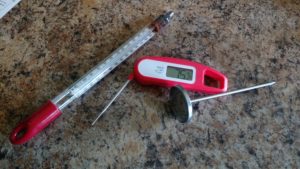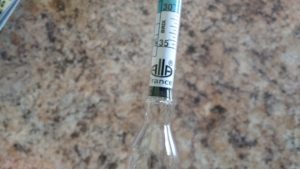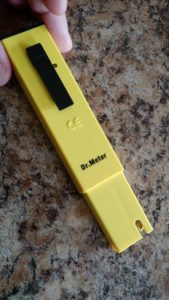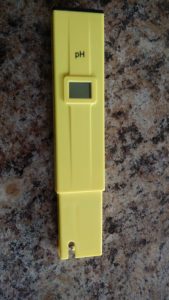Tag Archive: hydrometer
Homebrew Tool Calibration
I have issues. Efficiency issues. The first step to fixing a problem is admitting you have a problem. The second step is finding out who/where to blame the problem on!
This is the first in a series, although I do not know how long the series will be (until I fix the problem).
The most likely problem based on the sheer number of times I’ve done Internet research on this problem and had conversations with other homebrewers is the crush. I’ve never wanted to accept this as the problem because my LHBS uses the same mill (that may have changed now that they’ve moved to being an actual brewery and don’t want to spend two hours milling grain). However, I did my due diligence and accused asked them…
we sit right about 74-75%
— Paradise Brewing (@paradisebrews) August 12, 2016
The Twitter conversation goes on longer, but the end result is to check everything. So I did…
Temperature Probes
I compared the three at two temperatures and two of them (the dial and the Javelin that I normally use) at a third. In ice water, the floating thermometer and the dial agreed at 34ºF while the Javelin read 35ºF when the battery was kept out of the ice water (while it is waterproof, I think it is better to keep the battery out of the water). In tap temperature water, they all read 73ºF. In near-boiling water (with the stove turned off), the dial said 194ºF and the Javelin said 195ºF (I didn’t try the floating thermometer). I feel fairly confident that the Javelin, which I use the most, is close enough.
Hydrometer
My tap water (not distilled!) is at 0.999 SG after correcting for temperature, so we’ll go with 1.000. That’s a single-point calibration, which assumes that the hydrometer correctly measures throughout it’s range… which is a lofty assumption.
The second point was 15g sugar + 150g water, which by calculation should be 9.1º Plato, I got 10.2º Plato. HOWEVER, my scale is only accurate to 1g, so the range is 14.5g – 15.4g sugar + 149.5g – 150.4g water. This means that the calculated error could be anywhere from 8.8º Plato to 9.3º Plato. So I’m reading about 1.1º Plato high there.
I did a third point as well. 30g sugar (29.5g – 30.4g) +150g (149.5g – 150.4g) water. Should be 16.7º Plato in the range of 16.3º Plato to 17º Plato. I got 15.8º Plato, 1.1º Plato low. 16.5º Plato is 1.068, 15.8º Plato is 1.065. While this sounds like a lot, it isn’t, and I’ve been having problems on the order of 10 points (e.g. wanting 1.052 for 75% efficiency pre-boil and getting 1.043).
All this stuff seems so screwy (I tried the third point test twice) that I’m not considering this to be a done deal. But I’m buying a few more hydrometers!
pH Meter
I admit that I haven’t been as nice to this meter as I should – I dropped it in wort and rinsed it off, and I’m pretty sure it isn’t waterproof. But this thing is currently unusable. I checked it using distilled water (pH of 7.0), my tap water (pH of 8.1) and tap water with cream of tartar dissolved in it – which creates a buffer at a pH of 3.6.
I believe this meter worked correctly once. However, it no longer does. If I calibrate it at 7.0 (distilled water), the 3.6 pH buffer solution from cream of tartar is about 4.6 – 5.7 (that’s a huge range!) and it sets my tap water around 9.2 (it’s alkaline, but it’s not THAT alkaline!).
I’m going to replace this, but for now I’m going to rely on calculations using John Palmer’s spreadsheet.
Next Steps
I’m going to reread How To Brew (just the section about mash tuns) to make sure I didn’t screw up the mash tun somehow (I probably didn’t, but you never know). I’m going to redo the hydrometer test with at least two more hydrometers that I’m going to get this week (this is one of those things that we should have extras of anyway). I’m going to replace my pH meter (I kinda implied that already). I also may get a water sample to Ward Labs to see what my water is actually like coming out of the pipe.
Cheers!



